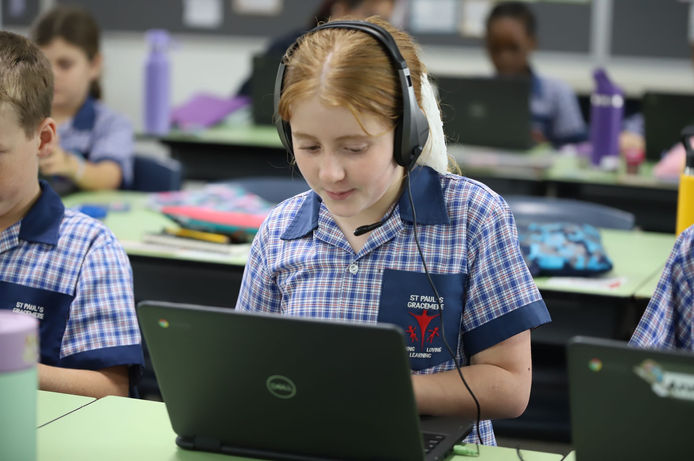

LEARN AT ST PAUL'S
St Paul’s is a learning community in which we strive to provide engaging and rigorous educational experiences in an environment where every person is valued, challenged and supported.
We nurture a whole school culture of high expectations, focused teaching and carefully sequenced learning that aims to be socially and culturally responsive and inclusive.
The Australian Curriculum identifies seven general capabilities. These are:
-
Literacy
-
Numeracy
-
Information and communication technology (ICT) capability
-
Critical and creative thinking
-
Personal and social capability
-
Ethical behaviour
-
Intercultural understanding
Together with the curriculum content in each learning area and cross-curriculum priorities, these capabilities encompass knowledge, skills, behaviours and dispositions that will assist students to become confident and involved learners and effective communicators who will be able to:
-
manage their own well-being;
-
relate well to others;
-
make informed decisions about their lives;
-
become citizens who behave ethically and with integrity;
-
become able to relate and communicate across cultures;
-
become able to work for the common good and act responsibly at local, regional and global levels.
At St Paul's, students currently undertake studies in the following key learning areas in line with the Australian Curriculum:

ENGLISH
It is vital that students and teachers be competent users of Standard Australian English. To achieve this, they need a language for learning about language; a language for interpreting, construction and responding to texts; and awareness that many languages and varieties of the English language are used in Australia and that each has its purposes and appropriate contexts.

RELIGION
Our religious curriculum is designed so that students have opportunities to develop an understanding and appreciation of the religious beliefs, values and practices of Christianity. Through this, students gain respect and appreciation for religious beliefs, attitudes and values of others and form a personal relationship with Jesus Christ. Students develop age-appropriate skills to research, discuss, reflect on and critique religion in an informed, intelligent and sensitive manner.

MATHEMATICS
Mathematics provides students with essential mathematical skills and knowledge in Number and Algebra, Measurement and Geometry and Statistics and Probability. It develops the numeracy capabilities that all students need in their personal, work and civic lives.

SCIENCE
Science is a discipline through which understandings of the living, material and physical world are developed and expanded. It is also a learning area through which students have the opportunity to develop important, transferable skills to prepare them to be informed, enterprising and creative adults.
The principles that guide scientific endeavour provide a powerful experience of values that underpin responsible citizenship. These principles include: respect for living things and the environment; respect for evidence and the opinions of others; honesty in collecting and presenting data; and openness to new ideas.

HaSS
The F–6 Humanities and Social Sciences (HaSS) curriculum encompasses knowledge and understanding from the four sub-strands of history, geography, civics and citizenship, and economics and business.

PHYSICAL ED
Opportunities will be provided to allow students to explore their health and well-being through engaging in physical activity as well as developing an understanding of how the human body works. Emphasis is given to developing within each child a positive attitude towards participation and competition.
OUR LEARNING BELIEFS
At St Paul’s, we believe that learning occurs through interactions with others and the world around us.
We understand that learners differ in age, gender, background, cognitive capacities, physical abilities, aptitudes, aspirations, dispositions, experiences and learning styles.
We aim to provide all learners with opportunities to develop knowledges, skills and dispositions that will motivate and empower them to be active, life-long learners and participants in their families, communities and wider contexts.
Planning for teaching and learning is founded on the core beliefs that:
-
all learners can succeed;
-
all learners learn at different rates, at different times and in different contexts;
-
successful learning promotes more successful learning;
-
teaching and learning must be based on sound research evidence that has been verified through classroom practice;
-
what counts as knowledge is ever-changing and depends on social context and cultural background;
-
there is a direct correlation between acquisition of valued knowledge and participation in society;
-
deep learning requires active engagement in the construction of meaning;
-
teachers are the key to student success at school learning;
-
facilitating and sustaining improvement in student learning must be a whole school and community focus;
-
all teachers and learners must be supported by each other and by curriculum leaders, parents and the wider community;
-
school processes and organisation must prioritise opportunities for teacher engagement in professional conversations in a diverse range of learning communities.
HABITS OF MIND
At St Paul's Arthur L. Costa's Habits of Mind provide a framework for thinking and talking about the dispositions and skills necessary to be an effective learner and an active participant at school and in the community.
Focus on the 16 Habits of Mind in all classes supports the development of students' General Capabilities. The intent is to encourage reflection, promote strategic reasoning, perseverance and creativity.
In each year level students develop understandings of the 16 Habits of Mind and are supported to apply them in everyday contexts. The aim is to equip our students to respond to real-life challenges by intentionally employing strategies that require mindfulness, awareness of self and others and focus on productive outcomes.













